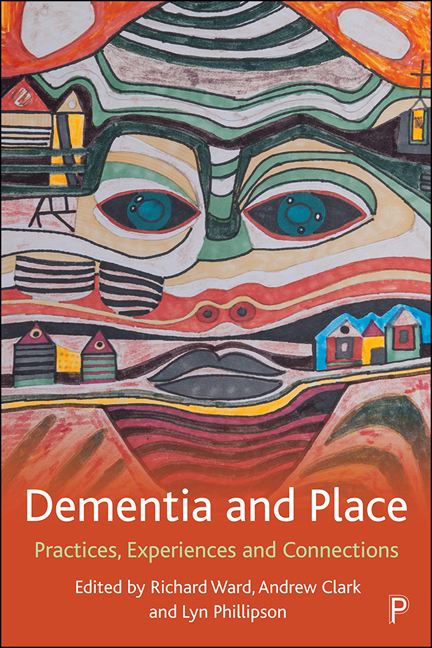Book contents
- Frontmatter
- Dedication
- Contents
- List of figures and tables
- Notes on contributors
- Acknowledgements
- 1 Introduction: Placing dementia
- 2 Understanding the meaning of neighbourhoods for people living with dementia: the value of a relational lens
- 3 Moving house with dementia
- 4 How do people with dementia manage problematic situations in public spaces?
- 5 Making and maintaining neighbourhood connections when living alone with dementia
- 6 My neighbourhood, my future ...?
- 7 Enabling the neighbourhood: a case for rethinking dementia-friendly communities
- 8 A conceptual framework of the person– environment interaction in the neighbourhood among persons living with dementia: a focus on out-of-home mobility
- 9 We’re known as ‘the girls’ around town: support, isolation and belonging for a lesbian couple living with dementia
- 10 Building community capacity for dementia in Canada: new directions in new places
- 11 The good, the challenging and the supportive: mapping life with dementia in the community
- 12 Growing back into community: changes through life with dementia
- 13 Dementia, tourism and leisure: making the visitor economy dementia friendly
- 14 Conclusion: Dementia emplaced
- Index
4 - How do people with dementia manage problematic situations in public spaces?
Published online by Cambridge University Press: 13 May 2022
- Frontmatter
- Dedication
- Contents
- List of figures and tables
- Notes on contributors
- Acknowledgements
- 1 Introduction: Placing dementia
- 2 Understanding the meaning of neighbourhoods for people living with dementia: the value of a relational lens
- 3 Moving house with dementia
- 4 How do people with dementia manage problematic situations in public spaces?
- 5 Making and maintaining neighbourhood connections when living alone with dementia
- 6 My neighbourhood, my future ...?
- 7 Enabling the neighbourhood: a case for rethinking dementia-friendly communities
- 8 A conceptual framework of the person– environment interaction in the neighbourhood among persons living with dementia: a focus on out-of-home mobility
- 9 We’re known as ‘the girls’ around town: support, isolation and belonging for a lesbian couple living with dementia
- 10 Building community capacity for dementia in Canada: new directions in new places
- 11 The good, the challenging and the supportive: mapping life with dementia in the community
- 12 Growing back into community: changes through life with dementia
- 13 Dementia, tourism and leisure: making the visitor economy dementia friendly
- 14 Conclusion: Dementia emplaced
- Index
Summary
Introduction
It is now well established that following a diagnosis of dementia, people value being able to continue with their lives and pursue everyday activities, including those performed outside the home, in public space (Öhman and Nygård, 2005; Phinney et al, 2007). In this chapter, public spaces are considered as places outside the home (Brorsson, 2013) and this includes spaces related to (1) retail/consumerism, administration and self-care locations, (2) places for medical care, (3) social, spiritual and cultural places, and (4) places for recreation and physical activities including places for transportation (Margot-Cattin et al, 2019).
Internationally, it is increasingly the case that cities are striving to be ‘dementia-friendly’ (Lin and Lewis, 2015) or ‘age friendly’ (WHO, 2007). Yet, public spaces still show deficits that limit activity and restrict the participation of older people and those living with dementia. Moreover, older people in general are sensitive to environmental planning and development; they often bear the consequences, as do people with dementia, of urban planning that has failed to include their needs or perspectives (WHO, 2007). However, there are differences in terms of the use and occupation of public space between individuals with dementia compared to a wider older population. For instance, it has been argued that people with dementia visit a more restricted range of public venues and spaces (Gaber et al, 2019), with associated changes to their social participation, in comparison to non-cognitively impaired older people (Gaber et al, 2020). As such, in order to develop both dementia-and age-friendly societies it is of paramount importance that older people with dementia are included in processes of urban planning, development and commissioning (Phillipson et al, 2018). As the well-established notion states: ‘Nothing about us, without us’ (Charlton, 1998), a mantra that has now been adopted by networks of people with dementia. However, to date there has been limited research on how problems in public spaces are experienced by people living with dementia and the strategies and actions they use to meet these situations. The aim of this chapter is therefore to add to our knowledge of how these situations arise and how people living with dementia respond. Such knowledge is vital in fostering a more accessible and usable public domain, providing insights that can inform and guide the direction of future policy and practice.
- Type
- Chapter
- Information
- Dementia and PlacePractices, Experiences and Connections, pp. 48 - 66Publisher: Bristol University PressPrint publication year: 2021



